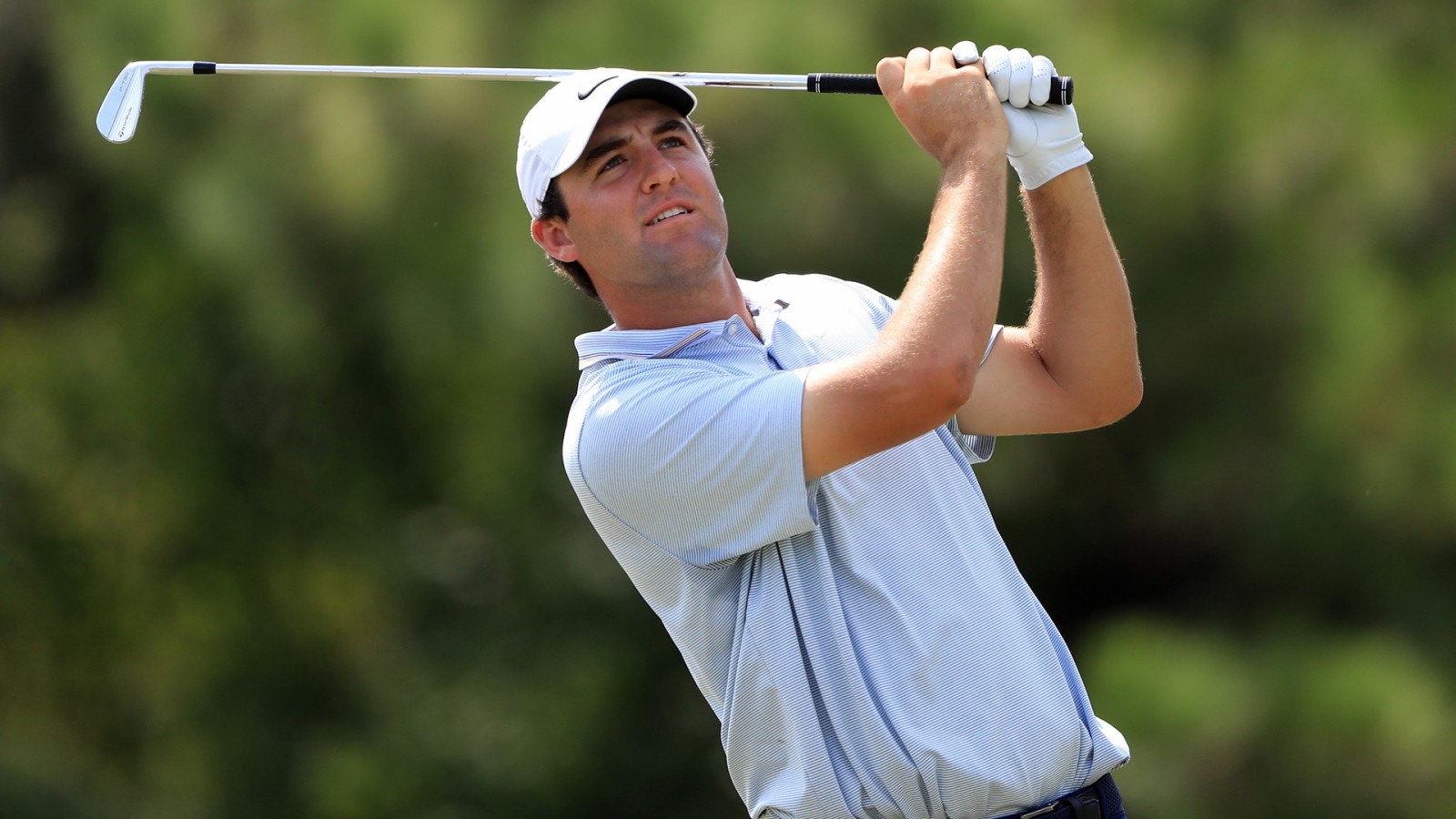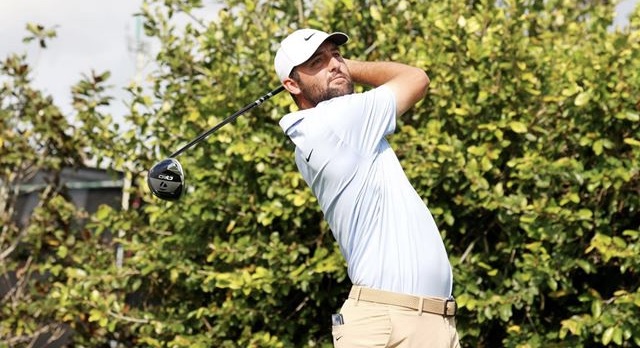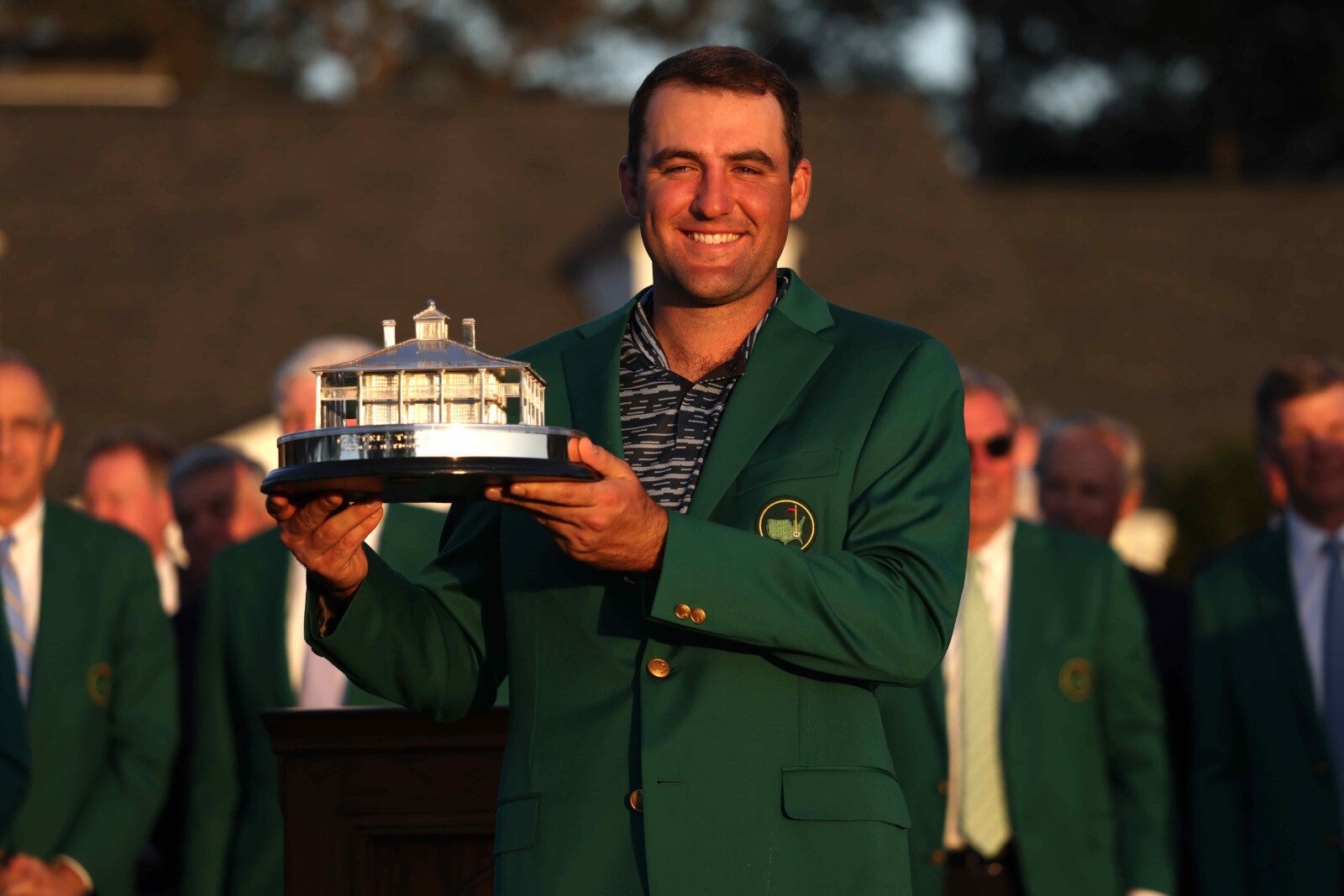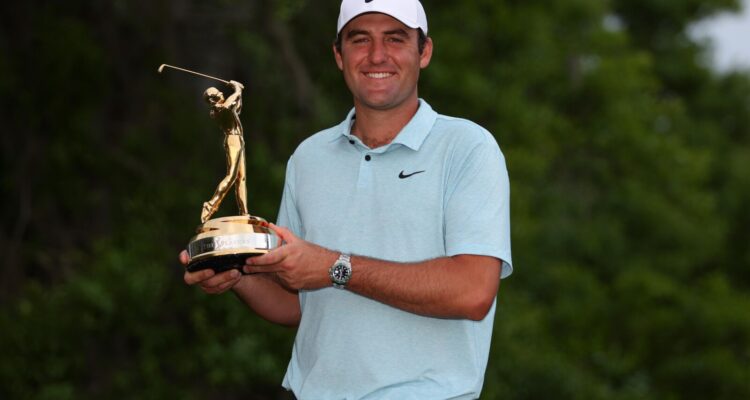Q. Coming off a big win at the Arnold Palmer Invitational presented by MasterCard. Maybe just some opening thoughts on that victory and coming back to the property?
SCOTTIE SCHEFFLER: Yeah, it was a good week last week. It’s nice to see some results of the work that we’ve been putting in, which was good. Good to be back here in Florida.
I like this golf course. Greens are a bit soft right now, but they’re also still really fast, which is kind of weird coming from last week where they were really firm and quite fast. But, yeah, getting used to the new type of grass, new bunkers, but, yeah, prep work has begun.
THE MODERATOR: All right, we’ll do questions.
Q. You’ve been world No. 1 for awhile, but it feels like last week was kind of a dominant performance, and the narrative from other guys is Scottie is the guy that we’re trying to catch right now. Do you welcome that challenge, and how do you kind of deal with those expectations?
SCOTTIE SCHEFFLER: I don’t really think about that kind of stuff. As far as the World Rankings go, it’s nice to be No. 1. I would much rather be No. 1 than No. 2, but in my day-to-day life, it doesn’t really affect anything. It’s probably a lot harder to stay at No. 1 than it is to get there, and so if it’s something that’s going to occupy a lot of my thoughts, I don’t think that’s a very good thing.
So when it comes to tournament weeks, being No. 1, I don’t get any extra strokes, doesn’t do anything for me starting a tournament, and so it doesn’t really matter at the end of the day.
Q. Obviously the putting stats were so much better last week. Did it feel better?
SCOTTIE SCHEFFLER: Yeah. I mean, it’s definitely hard to argue with like a day like Sunday. I think it’s nice — I talked about it a little bit on Sunday, but like it’s good to see where I’m at with my process, and the thing that I appreciated the most was Thursday after I got off to a really bad start on the greens, missed a few putts I should have made early in the round, and what I was most proud of last week was how I bounced back from things not going the way I expected them to.
It’s not like the whole week I just showed up and I made every putt. I was up a few strokes in putting, but I’m most proud of how I stuck to the process and bounced back from those kind of little mistakes.
Q. I know you’re probably sick of talking about your putter at the minute. But why did you change to a mallet putter? And, yeah, I suppose how did you come to that decision?
SCOTTIE SCHEFFLER: So I had tried a Spider during the playoffs last year. It was a little bit of a different type of Spider than the one I used last week. At times last year I struggled lining the ball up in the middle of the face, so I lined the ball up on the toe sometimes, and I struggled with a tiny bit of a heel strike, and that was just — you know, just became kind of my miss. Like if I was fighting a duck hook off the tee, I was fighting a little bit of a heel miss with the putter.
This Spider putter is really easy for me to line up. I don’t have to use the line on the ball. I line the putter up really well, and I line up in the middle of the face, and pretty much as simple as that. Kind of gives me just a really good visual.
Q. What is it when you look back at whether it’s your background or whatever, that allows you to be so unaffected? Obviously you’re in a much more prominent role now as No. 1 and whatnot, but you never really seem to waver at all. I don’t know if it’s your parents, your sisters, whatever. What is it that keeps you kind of grounded that way where you don’t get too full of it all?
SCOTTIE SCHEFFLER: Well, I think that’s a nice compliment, so thank you. I try not to get too into what we do out here. I think I attribute it mostly to my faith, but I also have a great upbringing. I have great parents. I have a great wife. We have great friends at home. So I’m surrounded by a lot of people that really don’t care very much whether or not I won last week.
It’s great, we’re going to celebrate, but at the end of the day, if I shot 75 on Sunday, I think Monday would have looked pretty similar to how it looked this week, besides maybe a few extra text messages in my phone that I received.
But at the end of the day, life goes on, a lot more than just my golf score, and this is just one little phase of my life, and it just happens to be in front of an audience. But outside of that, you know, home’s a lot more important to me than out here.
Q. For many who will never get to play this course, how would you describe what it’s like to step on to the 17th tee and play such an iconic hole?
SCOTTIE SCHEFFLER: On 17? It’s pretty wild when you get here in person. Sometimes when you’re standing there in the practice round, you’re like, how could people ever miss this green. Then you get up there and you start standing over your shot, and you’re like, man, wait a minute, the wind’s blowing off the right, it’s kind of firm now, and it’s a lot harder in competition than it is in practice.
But it’s always really special. You grew up watching this golf tournament, and to be here playing is always a special treat.
Q. Not to put you too much on the spot, family-wise, but did the chocolate cream pie that they made up here hold up to grandma’s?
SCOTTIE SCHEFFLER: Yeah, it did. We were here for media day on Monday last week and my grandma got to try their version of her chocolate cream pie. She said it was really good. I also thought it was really good. It didn’t quite get to grandma’s level, obviously, but it was pretty good.
Q. You wouldn’t say otherwise, even if you believed that, would you?
SCOTTIE SCHEFFLER: Yeah, definitely not.
Q. You won a major, you’ve contended in majors, and you’ve won this tournament. Is there anything about this event that’s getting closer and closer to a major championship status?
SCOTTIE SCHEFFLER: Well, I just think that it’s special to us as being members of the PGA TOUR because it’s our tournament. It’s our premier event. This is the home of the PGA TOUR, and so for us, I think it’s a special place to come back year after year and get to play this golf course and compete with the best players in the world and the best players on our TOUR, and, yeah, it’s always a fun week to come here and compete.
Q. It’s been five years since Tiger has played here and there’s no way of knowing whether he will play here again. How much would you look forward to the idea of maybe playing with him one more time or maybe even multiple times? It’s clear that it’s that his career’s winding down and you don’t know how many of those opportunities are left.
SCOTTIE SCHEFFLER: Yeah, yeah, I wish I had a crystal ball and I could tell you how many of those we had left, but anytime I think you get to play with — I mean, he’s definitely the best player I’ve ever seen, and I think he’s the best player we’ve ever had. Anytime you can stand up there and walk alongside him and compete in the same golf tournament as him is really special.
I’ve had the pleasure of playing with him at the Masters a couple years ago. It was the day he made the 10. That’s the thing is it’s all like — he’s just so much different I think than the rest of us. Like he’s won so many golf tournaments, and he makes a 10 on No. 12 at Augusta, and he birdies five of the last six holes, and it’s Sunday. I mean, it’s completely meaningless to him; like at that stage in his career, what’s the point? And for him just to step up there and completely turn it around — and I kid you not, he hit still to this day, three of the best iron shots I’ve ever seen hit coming into those last few holes, and it was just unbelievable to watch.
So anytime that we can get him out here competing and playing, I think it’s really special for all of us.
Q. As a follow-up to that, could you just talk about what it does for you personally when you are in a group with him knowing that it’s a pressure that’s different than anything else you’ve probably experienced on a golf course? How much benefit that is to you moving forward?
SCOTTIE SCHEFFLER: Well, I just learned a lot by watching him. I mean the way he competes in this game is different than a lot of players. He puts everything he has into every shot that he hits on the golf course, which I think is a really underrated skill out here. Like when he steps over a ball, at any moment in the golf tournament, whether it’s his first shot on Thursday or the last shot on Sunday, I feel like he is as into it as he could possibly be. I just learned that from watching him, the way he read greens, the way he approached pitch shots and iron shots and tee shots. There was never a moment in that round where he wasn’t going at it a thousand percent, which is a lot easier I think said than done.

Q. You told a story awhile back that when you were about like six or seven at Royal Oaks in Dallas, someone on the driving range challenged you to hit a pole that was about a hundred yards out, and if you did, that he would buy you a car when you were 17. Now your dad said that you hit it twice. Do you remember that, and any update on the car? Are you still waiting on that?
SCOTTIE SCHEFFLER: I’m still waiting on the car. You know, no — as far as the story goes, Randy’s here this week, so if you see Randy you can ask him the story, but it was something along the lines of he’ll give me five shots to hit the pole and I’ll get a car when I turn 16, just said it in gest. And I think I hit it maybe on the third try and then I was like eight years old at the time, so it was more of a joke than anything. So, yeah, still waiting on the car, but yeah, ask Randy. I think it’s true, but we’ll see.
Q. Speaking of Randy, I think it’s the first time in a while that he’s been out here while some players have their swing coaches out here on TOUR every single week. How has that process gone for you not having like a second set of eyes immediately after a round while still maintaining this level of ball striking that you have for the pass two years?
SCOTTIE SCHEFFLER: Well believe it or not, Randy’s pretty tech savvy. He’s got this iPad where he can watch shots and stuff, so he’s actually — he gets a lot of info. Blake got him set up with his iPad, and he can watch live coverage and all that stuff. I think that’s the most valuable. If he can have anything to say, he can usually communicate it either directly to me or Ted when we’re on the range. I can FaceTime him.
I just don’t really think it’s that complicated. I think that a lot of the stuff he can see on TV and I can tell him what I’m feeling, and I mean, he’s basically taught me everything I know about the game of golf and so I don’t think it’s really hard for him to watch and just see what I look like out there and kind of know if there’s an issue and if there’s not an issue.
Q. Over the last year how many different putters do you think you’ve tested, and why do you think the new one has proved most successful? What’s different about it?
SCOTTIE SCHEFFLER: Well, first of all, I don’t know. Second of all, like I said earlier, it makes it easier for me to line it up in the center of the face. It’s good for me visually, and I like the way kind of the ball comes off the face, and so it’s helping me just be more kind of outward with my putting than focusing on what’s going on right here, just focusing on the picture of the putt.
Q. If you throw Tiger out for a minute, in your time on paying attention to golf, who’s been the last dominant figure do you think on the PGA TOUR?
SCOTTIE SCHEFFLER: Well, you kind of put me in a little corner here by taking Tiger away. I mean, to be completely honest, I think as far as I’m concerned and in my lifetime, Tiger’s really been the guy that’s dominated basically for the last — since 1997 up until about 2020, whenever he really got hurt. I don’t know if we’ll ever see anything like that again in the game of golf.
As far as who else has been dominant, I think you’ve had a lot of guys that go through stretches where they are. You know, you had Jordan go through his stretch; you had a year where JT won five times; you had those years where Rory was winning majors by a bunch of shots. Nobody’s really been able to have the longevity that Tiger had.
But yeah, there’s always certain guys that kind of pop up on the radar and win a bunch of tournaments at once. Like Jason Day is another guy who did it. I’m sure if you give me a few more minutes, I can think of some more, but nobody really had that kind of sustained…

Q. Trying to bring Baby out of corner here, but probably throw yourself of late, D.J., maybe a couple —
SCOTTIE SCHEFFLER: D.J., as well, yeah.
Q. — Jon during his stretch. I guess my question is how hard would it be to do now, and how much would it either help or hurt golf if it ever happened, not to Tiger’s level, but to a kind of a sustained maybe two to three to four years’ level?
SCOTTIE SCHEFFLER: I think it would be good for the game. I think anytime you have a figure that kind of dominates, like I think of like the NBA, you look at Steph Curry for those years where the Warriors were winning a bunch, people would say they got tired of it, but at the end of the day, people were still showing up and watching because he was incredible to watch, and you want to watch greatness when you’re out there.
So I think it would be good for the game of golf, and we’ll see what happens with the sport in the next few years. It’s a pretty challenging game and we’ve got a lot of talent out here, so being that dominant figure I think is a very tall task to ask of anybody, but we’ve got some guys out here that I think can definitely pull it off.
Q. A lot of people were talking about the World Rankings and if it they’re accurate, not accurate, so forth and so on. During your tenure of being world No. 1, did you feel always that you were playing or you were world No. 1?
SCOTTIE SCHEFFLER: Did I feel like that? I wouldn’t say so. I mean, I never really thought of myself as world No. 1, so I wouldn’t really want to compare myself too much to other people. As far as the accuracy of the World Rankings go, at the top I think they’re fairly accurate, and then when you get more into the lower ranks, it becomes pretty skewed, obviously, because there’s certain groups of guys that aren’t getting any ranking points.
It was kind of the thing that you saw when guys went to LIV. Their golf games took a little bit of a hit, just basically from a strokes gained perspective. You have another ranking system you can look at for the strokes gained.
I would say arguably that would be a more accurate ranking system now. The World Rankings I still think is a good ranking system, but it’s missing a few players, for sure.
Q. Do you think also, just to go about something else, do you think also these fields now with those guys playing on other tours, do you think these fields lack to some extent because they’re not here?
SCOTTIE SCHEFFLER: I don’t really spend much time in my day thinking about them. It’s kind of one of the out of sight, out of mind things, and the people that want to be on this TOUR are still here, and the guys that want to compete out here are still here.
So we’ve got a lot of great competition. I’m excited with the new tournament schedule getting the best players on our TOUR all together as much as we can, and I think we’re in a great spot.

Q. Jay earlier was talking a little bit about maybe fans feeling like they haven’t had their voice felt over the last couple of years. I’m wondering, among the players, how much of a concern is it that fans are maybe feeling a little disillusioned or disenchanted by the developments over the last couple years, the splintering of the stars across two tours, all the talk about money. Among the players, how much of a concern is that?
SCOTTIE SCHEFFLER: Well, I guess it’s a pretty broad question, and when you’re talking about a fan perspective, you’re talking about millions of people, so there’s always a lot of perspectives in that group. It just depends on who has the loudest voice.
At the end of the day, I think we’re trying to do our best to create the best product for the fans, but we can’t control whether or not guys want to leave. If guys want to go take the money and leave, then that’s their decision. I’m not going to sit here and tell guys not to take hundreds of millions of dollars. If that’s what they think is best for their life, then go do it. I’m not going to sit here and force guys to stay on our TOUR.
But at the end of the day, this is where I want to be, and we’re continuing to grow what we’re doing, and what they’re doing is not really a concern to me.
If the fans are upset, then look at the guys that left. We had a TOUR, we were all together, and the people that left are no longer here. At the end of the day, that’s where the splintering comes from.
As far as our TOUR goes, like I said, we’re doing our best to create the best product for the fans, and that’s really where we’re at.
Q. You’ve maintained pretty historic ball striking, at least by strokes gained, through to this season. Just wondering, are you tweaking things constantly with your swing because when we see you it just seems like it’s been automatic for the last year, but are you constantly still making tweaks to what the swing looks like?
SCOTTIE SCHEFFLER: Yeah, for sure. I think golf’s a pretty challenging game and so I’m constantly putting in the work to maintain where I’m at. Always working on my grip, always working on the fundamentals. Usually when my swing gets out of whack, it’s usually something fundamental that’s going wrong. It’s going to cause some sort of, you know, thing to happen in my swing and it usually always comes down to the fundamentals of setup and whatnot.
Q. In terms of the putting, is that something so fickle that you never feel like that could be sustained for long stretches, or do you feel like that’s achievable?
SCOTTIE SCHEFFLER: Do I feel like what’s achievable?
Q. Like sustained success with the putting based on how fickle it is, misses, you know.
SCOTTIE SCHEFFLER: I mean, yeah, I think in certain ranges you see guys that are really good putters. Like if you were to look at the data of let’s say like a Denny McCarthy, I’m sure statistically inside of 20 feet he’s always one of the best. But once you get outside of that range, it really becomes a little bit more of luck involved. Like the guy you see leading from 40 feet every year is not the same, but the guys you see leading from five to 15 feet are probably pretty similar each year.
Q. You went from using the line on the ball to not using the line and switching putters because that helps you line up. I’m just wondering what are the pros and cons in your mind of each? Like what did each method help you do better than others?
SCOTTIE SCHEFFLER: Yeah, that’s a good question. So, I guess I’ll start here: Like when you’re not performing as well as you should at something, what is the solution always? Typically just to try harder at that thing. Well, if you’re missing your jump shot, well, you need to practice your jump shots more, and if I’m missing putts, well, then I need to practice my putting more.
But I think it goes a little bit more in depth than that. At times last year I think I definitely tried too hard on my putting, and the idea of not going to the line is to become more free over the ball.
I’ve found a putter now where when I — or I found a putter now that I line up very well, and the line on the ball I was using to help myself line up. I wasn’t using it as trying to hit it perfect each time or using it in anything else other than to try and help myself line up.
At times I think it got to the point where a ball would go in, but if that ball didn’t roll end over end, at the back of your head, you’re like, wait, did I hit that putt really good? I think sometimes I expected perfection out of myself, and I’m like that in a lot of different things, so when it comes to the putting, now not using the line just to be more free to not try as hard, which is a heck of a lot easier said than done because, you know, worked my entire life to get here to the PGA TOUR, and to have chances to win majors, have chances to win tournaments out here. And it’s a lot easier to say, Hey, it doesn’t really matter if you miss or make it, but at the end of the day it matters a heck of a lot to me whether that putts goes in or not. But it’s about sticking to my process and controlling what I can control, and that’s having a good attitude and hitting a good putt, and not using the line has helped a lot in that.
Q. No one’s defended a title here so far ever. What do you think makes it so tough? Also, what do you think you’re going to have to do to hopefully be the first one to get that done?
SCOTTIE SCHEFFLER: I just think it’s a golf course where you don’t see a lot of repeat winners in general. There’s not a guy that you have seen win on this golf course a bunch. I think it’s just the nature of the course, it doesn’t really suit one type of player. It really is a Pete Dye, just kind of genius design, where you have to hit all different kinds of shots, and it tests you in a lot of different ways. That’s why I think it’s one of the best places we play on TOUR, just because it really doesn’t suit one type of player. Bomb and gouge doesn’t really work out here, you kind of got to plot your way around. But then you even have the shorter hitters that plot it around that can struggle here, because you got to hit it exactly where you’re looking or you’re going to be punished pretty severely out here.



